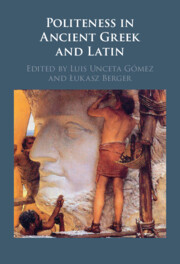18 results

Politeness in Ancient Greek and Latin
-
- Published online:
- 08 September 2022
- Print publication:
- 08 September 2022
Index Locorum
-
- Book:
- Politeness in Ancient Greek and Latin
- Published online:
- 08 September 2022
- Print publication:
- 08 September 2022, pp 406-410
-
- Chapter
- Export citation
Chapter 1 - Im/Politeness Research in Ancient Greek and Latin
- from Part I - Introduction
-
-
- Book:
- Politeness in Ancient Greek and Latin
- Published online:
- 08 September 2022
- Print publication:
- 08 September 2022, pp 3-42
-
- Chapter
- Export citation
Chapter 8 - Im/Politeness of Interruptions in Roman Comedy
- from Part III - Im/Politeness in Use
-
-
- Book:
- Politeness in Ancient Greek and Latin
- Published online:
- 08 September 2022
- Print publication:
- 08 September 2022, pp 202-226
-
- Chapter
- Export citation
Copyright page
-
- Book:
- Politeness in Ancient Greek and Latin
- Published online:
- 08 September 2022
- Print publication:
- 08 September 2022, pp iv-iv
-
- Chapter
- Export citation
Abbreviations
-
- Book:
- Politeness in Ancient Greek and Latin
- Published online:
- 08 September 2022
- Print publication:
- 08 September 2022, pp xv-xvi
-
- Chapter
- Export citation
Index Rerum
-
- Book:
- Politeness in Ancient Greek and Latin
- Published online:
- 08 September 2022
- Print publication:
- 08 September 2022, pp 404-405
-
- Chapter
- Export citation
Part II - The Expression of Im/Politeness
-
- Book:
- Politeness in Ancient Greek and Latin
- Published online:
- 08 September 2022
- Print publication:
- 08 September 2022, pp 43-144
-
- Chapter
- Export citation
Part IV - Ancient Perceptions on Im/Politeness
-
- Book:
- Politeness in Ancient Greek and Latin
- Published online:
- 08 September 2022
- Print publication:
- 08 September 2022, pp 293-365
-
- Chapter
- Export citation
Contents
-
- Book:
- Politeness in Ancient Greek and Latin
- Published online:
- 08 September 2022
- Print publication:
- 08 September 2022, pp v-vi
-
- Chapter
- Export citation
Part I - Introduction
-
- Book:
- Politeness in Ancient Greek and Latin
- Published online:
- 08 September 2022
- Print publication:
- 08 September 2022, pp 1-42
-
- Chapter
- Export citation
Part III - Im/Politeness in Use
-
- Book:
- Politeness in Ancient Greek and Latin
- Published online:
- 08 September 2022
- Print publication:
- 08 September 2022, pp 145-292
-
- Chapter
- Export citation
Contributors
-
- Book:
- Politeness in Ancient Greek and Latin
- Published online:
- 08 September 2022
- Print publication:
- 08 September 2022, pp ix-xii
-
- Chapter
- Export citation
Preface
-
- Book:
- Politeness in Ancient Greek and Latin
- Published online:
- 08 September 2022
- Print publication:
- 08 September 2022, pp xiii-xiv
-
- Chapter
- Export citation
Figures and Tables
-
- Book:
- Politeness in Ancient Greek and Latin
- Published online:
- 08 September 2022
- Print publication:
- 08 September 2022, pp vii-viii
-
- Chapter
- Export citation
References
-
- Book:
- Politeness in Ancient Greek and Latin
- Published online:
- 08 September 2022
- Print publication:
- 08 September 2022, pp 368-403
-
- Chapter
- Export citation
Glossary
-
- Book:
- Politeness in Ancient Greek and Latin
- Published online:
- 08 September 2022
- Print publication:
- 08 September 2022, pp 366-367
-
- Chapter
- Export citation
A NEW COMMENTARY ON PLAUTUS’ PSEUDOLUS - (D.) Christenson (ed.) Plautus: Pseudolus. Pp. viii + 408. Cambridge: Cambridge University Press, 2020. Paper, £24.99, US$32.99 (Cased, £79.99, US$105). ISBN: 978-0-521-14971-6 (978-0-521-76624-1 hbk).
-
- Journal:
- The Classical Review / Volume 71 / Issue 2 / October 2021
- Published online by Cambridge University Press:
- 29 June 2021, pp. 385-387
- Print publication:
- October 2021
-
- Article
- Export citation

